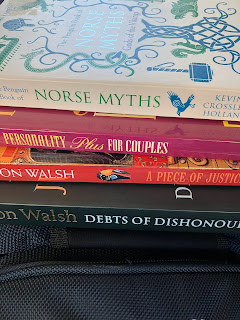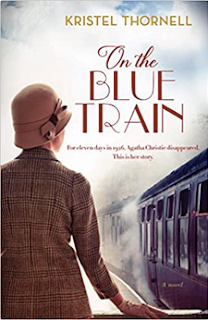Dear reader, I had a holiday. First time since 2016. And I gloried in READING for a whole week (as well as swimming and walking along beaches and through rainforest, eating yummy food and spending quality time with my mates and my husband (and dealing remotely with various disasters unfolding at home, but that's enough of that!)). I read beside the pool, I read beside the sea, I read on the deck of the rainforest retreat, I read in an air conditioned room we dubbed 'the Singapore Sling Room' for its cane furniture. And I also read on the plane and in the airport.
I quickly whipped through the three books I'd brought with me. First up was Merlin's Harp by anne Eliot Compton, a King Arthur tale from the refreshing point of view of Fey woman Nivienne, whose life intersects with Arthur's at crucial moments. Like The Mists of Avalon, this novel puts women's experience front and centre, with the added twist of Nivienne's Fey powers giving her extra insight -- she can see auras, and scry the future in water and flame. At times there were odd repetitions that gave the feeling that the story had been written over a long period of time and the author had lost track of the joins, but this was a fresh and lyrical take on the Arthur story that I very much enjoyed.
Next I finished Complications: A Surgeon's Notes on an Imperfect Science, by American surgeon Atul Gawande. This is his first book, though I read Being Mortal first. Complications is more of a collection of essays on various medical topics -- weight, nausea, mistakes, mysterious cures -- and Gawande takes us behind the Staff Only doors to witness the pressure, the care, the ambition, the stress and the glories of a doctor's daily routine. Gawande's clear, calm, engaging voice makes him an ideal companion through this difficult terrain, and I hope he keeps on writing.
My third book was a re-read of an old favourite that I found in a street library but weirdly didn't own already: Dorothy L. Sayers' Clouds of Witness. This is a relatively early Lord Peter Wimsey novel, about his brother being accused of murder, set before Peter meets Harriet, but it was hugely fun to read. It was odd to reflect that it's almost exactly a hundred years old, and that Wimsey flying back across the Atlantic with vital evidence was a feat of death-defying courage, not a routine commute!
Time for a visit to a secondhand bookshop (luckily Cairns has several), where I picked up the haul you can see in the photo above. I rapidly finished off Personality Plus for Couples by Florence Littaeur and spent the next couple of days telling my holiday companions whether they were Sanguine, Phlegmatic, Melancholy or Choleric. Littaeur's books are very heavy on Jesus, and God's plan (which seems to be that all couples should stay together no matter what, which I cannot endorse) but if you can get past that, I actually think the personality stuff is spot on!
Next was the second of Jill Paton Walsh's Imogen Quy (rhymes with why) mysteries, A Piece of Justice. I settled happily into this Cambridge-set cosy mystery, centred on a residential college in the 1990s and featuring quilting, which was a nice feminist twist! I immediately bought the first volume in the four book series, The Wyndham Case, on my Kindle, and read almost all of it on the plane on the way home (sob). Another good thing about Imogen Quy books is that they are nice and short. I can definitely see why Jill Paton Walsh was the right person to take up Dorothy L. Sayers' mantle and finish Peter and Harriet's story.
Finally I hoed into Kevin Crossley-Holland's retelling of Norse legends with Norse Myths: Gods of the Vikings. I don't know much about the Norse gods and I've only watched one Thor movie, but Crossley-Holland's versions are wonderfully resonant, well researched and conjure up an entire vanished world. Each myth comes with a detailed note explaining which sources the author drew upon, and how he sees the myths fitting together (they are often wildly contradictory). I can see now why Thor, Odin and Loki made such appealing characters for blockbusters -- there is a lot to work with!
And thus I returned home, having read seven books in six days. Perfect!

























